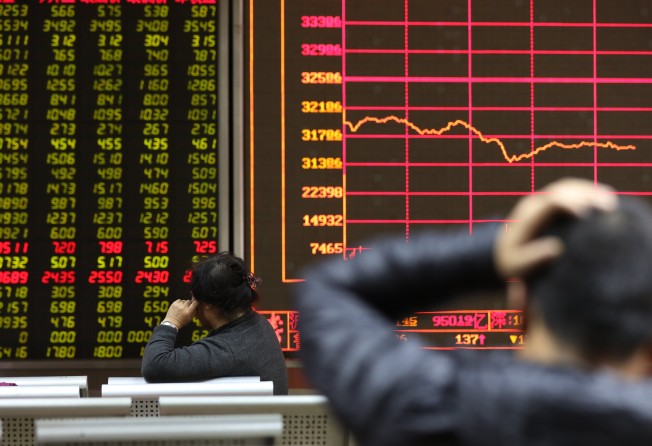China stocks officially in bear territory, lose market cap bigger than Canada’s entire economy
Trade war tensions ‘create bad sentiment for the market as a whole’

Shanghai’s benchmark stock index plunged to its lowest level in two years, driving Asia’s largest equity bourse down into official bear market territory, as concerns about a trade war with the United States sent investors scurrying to extract funds from equities.
Overall, Chinese stocks have lost about US$1.6 trillion in total value – more than the size of Canada’s entire economy – since a high in January, threatening to dethrone China as Asia’s largest capital market in the process. The Shanghai Composite Index dropped 0.5 per cent at the close on Tuesday.
It has fallen by 20 per cent from its January peak, officially marking the bourse as a bear market. A loss of another 6 per cent in market cap will cede the title of the region’s biggest stock market to Japan.
“New economy companies such as internet services firms are the most affected by the stoking of trade war tensions, which create bad sentiment for the market as a whole,” said Gordon Tsui, director at Hong Kong-based finance house Hantec Pacific. “The market needs more funding from banks to support these industries. As trade tensions get worse, there will be a major market correction.”
Markets fell across Asia, with 11 key indexes including those in South Korea and Australia declining, compared with seven, including Japan and Thailand, that managed to eke out small gains.
Chinese investors have not witnessed a market rout since 2015, when a crash wiped out US$5 trillion in market value. About a third of the stocks on the Shanghai and Shenzhen exchanges were technically oversold on Tuesday, with their 14-day relative strength indexes breaching the level of 30, according to Bloomberg data.
Telecoms has been the worst-performing sector among all industry groups since the high in January, with a sub gauge on the CSI 300 Index tumbling by 38 per cent. Among them, ZTE, which is at the centre of a China-US trade dispute for breaching American sanctions, has tumbled by 64 per cent, and fibre optical maker Jiangsu Zhongtian Technology, by 33 per cent.
China’s ongoing deleveraging drive and increased scrutiny of its asset management industry risk derailing growth in the world’s second-largest economy, adding to jitters among investors, according to Victoria Mio, chief investment officer for China at international asset manager Robeco.
“The market is pricing in the concern about China’s economic outlook, as major economic data including fixed-asset investment and retail sales in May were all worse than expected,” she said. “Global investors are also concerned the trade war between China and the US will spill over to other countries, because some supply chains, such as the tech hardware industry, are global ones.”
Robeco, which has US$193 billion in assets under management, is now seeking shelter in Chinese consumer stocks, which are believed to be immune to the trade friction with the US, and is avoiding companies with the most exposure to US sales, from textile apparel makers to semiconductor and auto parts manufacturers.
The Shanghai Composite Index dropped 14.83 points to 2,844.51, while a key gauge on the smaller Shenzhen exchange in southern China tumbled as much as 1.6 per cent in intraday trading before rebounding by 0.6 per cent to 1,596.17.
The negative market sentiment spilled over into Hong Kong, weighing down the Hang Seng Index by 0.3 per cent to 28,881.40, and pulling down the China Enterprises Index by 0.8 per cent to 11,118.89.
“Investors are scared there will be more tariffs that would hurt China’s consumption and trade markets,” said Kingston Lin King-ham, director at Hong Kong-based AMTD securities brokerage. “Worries are also growing about a property bubble and its debt risks after China signalled that it will not inject fresh funds into the sector.”
Property developers and building material companies were the biggest decliners on Tuesday, after a slew of tier 2 cities unveiled fresh measures to curb rising home prices. Following the example of the northwest city of Xi’an, Changsha, capital of the southern province of Hunan, banned corporate purchases of homes and tightened qualifications for home buying by individuals.
China Vanke, the country’s biggest developer, dropped by 3.6 per cent to 25.54 yuan in Shenzhen and its shares traded in Hong Kong shed 1.3 per cent to HK$27.75.
Poly Real Estate Group sank by 4.6 per cent to 12.48 yuan and Anhui Conch Cement, China’s biggest maker of the building material, shed 4.2 per cent to 33.23 yuan.
In Hong Kong, Country Garden Holdings plummeted by 6.7 per cent to HK$13.76, and Sunac China Holdings was 4.8 per cent lower at HK$27.70.
With additional reporting by Karen Yeung